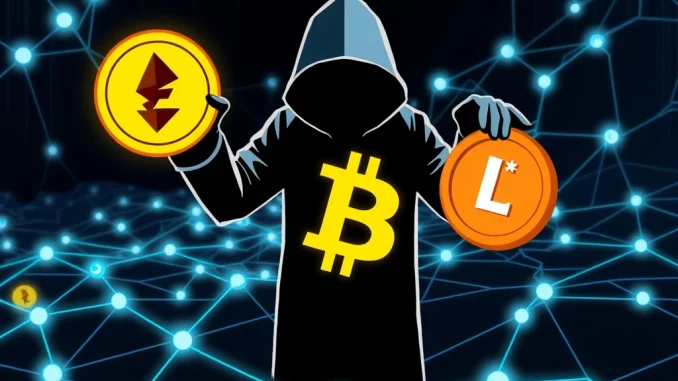
Hold onto your crypto wallets! A chilling development has emerged from the decentralized finance (DeFi) space. In a move that has sent ripples through the crypto community, an address linked to the recent Zoth infrastructure breach has been tracked converting a substantial sum of Ethereum into Bitcoin and Litecoin. Let’s dive into the details of this audacious crypto heist and what it means for the future of DeFi security.
What Exactly Happened in this DeFi Hack?
According to PeckShield, a leading blockchain security platform, a wallet associated with the Zoth hack transferred a massive 1000 ETH – valued at approximately $1.5 million – to THORChain. THORChain, known for its cross-chain bridge capabilities, became the conduit for this illicit conversion. Here’s a breakdown of the key events:
- Initial Breach: DeFi infrastructure firm Zoth was targeted in a security breach.
- Funds Movement: A hacker-controlled address moved 1000 ETH.
- THORChain Utilization: The ETH was deposited into THORChain.
- Cross-Chain Swap: The ETH was then swapped for Bitcoin (BTC) and Litecoin (LTC).
- Security Alert: PeckShield alerted the crypto community via X (formerly Twitter).
[img] [/img]
Why is an Ethereum to Bitcoin Swap Significant in this Crypto Exploit?
The hacker’s decision to swap Ethereum for Bitcoin and Litecoin is strategically significant. Here’s why:
- Obfuscation: Converting ETH to BTC and LTC across different blockchains makes tracking the funds more complex. It’s a classic tactic to muddy the waters and hinder investigators trying to trace the stolen assets.
- Liquidity and Anonymity: Bitcoin and Litecoin, being more established and widely traded cryptocurrencies, offer greater liquidity and potentially more avenues for further anonymization compared to ETH, especially after being flagged as stolen.
- Breaking the Chain: Moving from the Ethereum ecosystem to Bitcoin and Litecoin ecosystems breaks the direct traceability within the Ethereum network, forcing investigators to follow the funds across multiple blockchains.
This move suggests a degree of sophistication and planning on the part of the hacker, indicating they are not just after a quick cash grab but are thinking about long-term fund laundering strategies.
Crypto Security Under Scrutiny: Are DeFi Platforms Safe?
This latest incident throws the spotlight back on the ever-present question of crypto security, especially within the DeFi realm. While DeFi promises decentralization and financial freedom, it also presents unique security challenges.
Challenges in DeFi Security:
- Smart Contract Vulnerabilities: DeFi platforms rely heavily on smart contracts, which, if not rigorously audited, can contain vulnerabilities that hackers can exploit.
- Cross-Chain Bridges: Bridges like THORChain, while innovative, can become targets due to the large volumes of assets they handle and the complexity of cross-chain communication.
- Decentralization Dilemma: The very nature of decentralization can make it harder to respond to and mitigate hacks quickly compared to traditional centralized systems.
- Evolving Threat Landscape: Hackers are constantly developing new techniques, making it a continuous cat-and-mouse game between security experts and malicious actors.
Despite these challenges, it’s crucial to remember that not all DeFi platforms are inherently unsafe. Many projects prioritize security and undergo rigorous audits. However, users must remain vigilant and informed.
Actionable Insights: How to Enhance Your Crypto Security
In the wake of events like the Zoth DeFi hack, what can you do to bolster your own crypto security posture? Here are some actionable insights:
| Actionable Insight | Description |
|---|---|
| Due Diligence | Thoroughly research DeFi platforms before using them. Look for audits, team transparency, and community feedback. |
| Hardware Wallets | Store your crypto assets, especially larger amounts, in hardware wallets for enhanced security against online attacks. |
| Diversification | Don’t put all your eggs in one basket. Diversify your crypto holdings across different platforms and assets to mitigate risk. |
| Stay Informed | Keep up-to-date with the latest crypto security news and best practices. Follow security experts and reputable news sources. |
| Risk Assessment | Understand the risks associated with DeFi and only invest what you can afford to lose. |
The Future of Crypto Security and Blockchain Exploit Prevention
The Zoth blockchain exploit and the subsequent Ethereum to Bitcoin swap serve as a stark reminder of the ongoing challenges in crypto security. As the DeFi space continues to grow and evolve, so too must the security measures and protocols in place. Increased investment in smart contract audits, enhanced cross-chain security measures, and proactive threat intelligence are crucial steps forward.
The incident also underscores the importance of community vigilance and transparency in the crypto world. Platforms like PeckShield, by rapidly reporting on-chain movements, play a vital role in keeping the community informed and potentially aiding in fund recovery efforts.
In Conclusion: Navigating the DeFi Landscape Safely
The Zoth hack and the hacker’s clever maneuver of swapping Ethereum to Bitcoin and Litecoin highlight the sophisticated nature of crypto threats. While the incident is concerning, it also provides valuable lessons. By staying informed, practicing robust security habits, and supporting projects that prioritize security, we can collectively work towards a safer and more resilient DeFi ecosystem. The journey of decentralized finance is still in its early stages, and navigating it safely requires constant learning, adaptation, and a strong commitment to security from both platforms and users alike.



